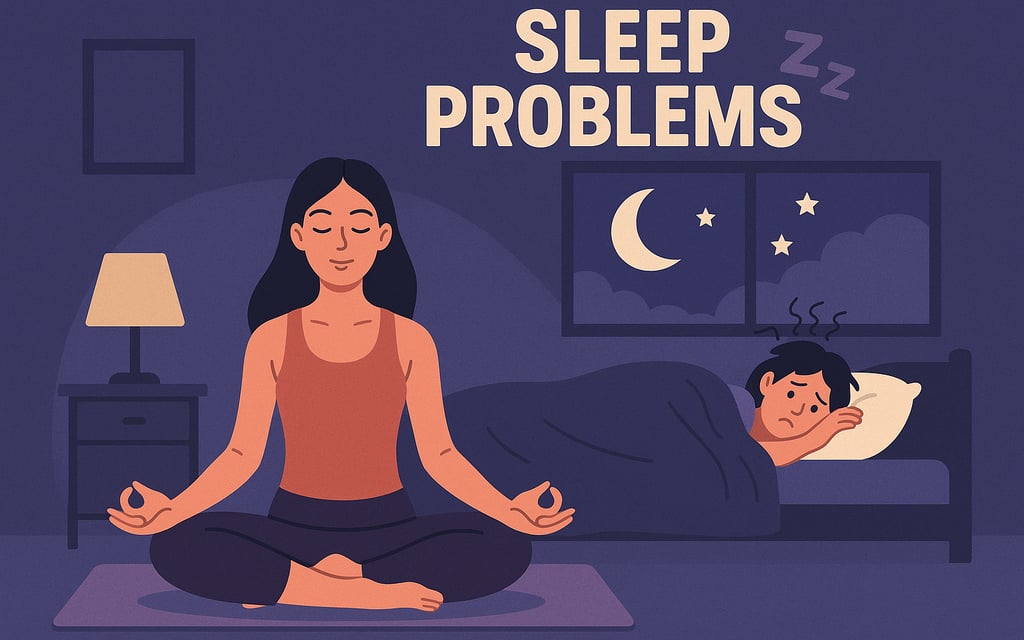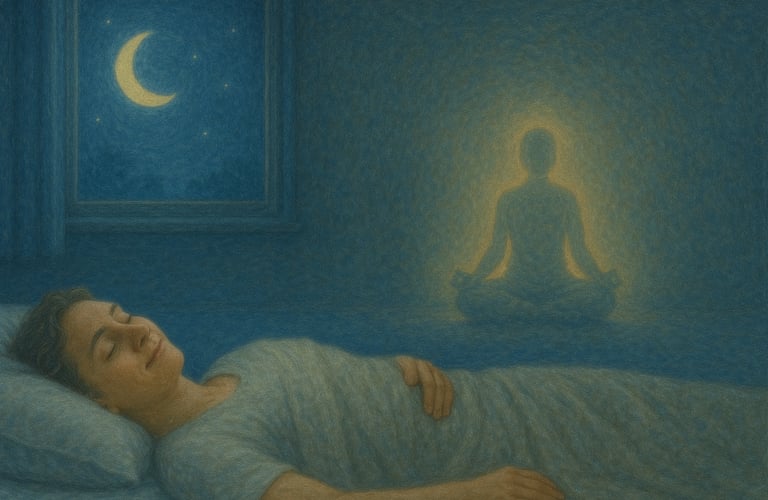SLEEP, SPIRITUALITY AND CLASSICAL HATHA YOGA IN RISHIKESH
KRITIK GUPTA
4/27/20255 min read


For someone walking the spiritual path, the journey inward often involves a conscious re-evaluation of life's fundamental aspects. Among these, sleep, a seemingly passive state, holds profound significance. It's not merely a biological necessity but a crucial element that can either hinder or enhance our progress on this inner exploration. Personally, as I've delved deeper into yogic practices, which are offered at leela yoga school in Rishikesh, my relationship with sleep has undergone a fascinating transformation.
The Universal Need: Why Sleep Matters?
Before we delve deeper into the hatha yoga context, let's acknowledge the undeniable importance of sleep for everyone. It's the body and mind's essential period of repair and rejuvenation. During sleep:
Physical Restoration: Our muscles relax, tissues are repaired, and energy reserves are replenished. Growth hormones are released, crucial for physical development and maintenance.
Cognitive Function: The brain consolidates memories, processes information gathered during the day, and clears out metabolic waste products. Adequate sleep is vital for focus, concentration, learning, and problem-solving.
Emotional Well-being: Sleep deprivation can lead to irritability, mood swings, increased stress levels, and even contribute to mental health issues. Restful sleep helps regulate emotions and promotes a sense of calm and stability.
Immune System Support: Sleep strengthens our immune system, making us more resilient to illness. Chronic sleep loss weakens our defenses, leaving us vulnerable to infections.
Ignoring our sleep needs has far-reaching consequences, impacting our physical health, mental clarity, and overall well-being.
Sleep vs. Restfulness: A Subtle Yet Significant Distinction
Often, we equate long hours in bed with adequate rest. However, there's a crucial difference between simply sleeping and experiencing true restfulness. Sleep is the state of unconsciousness, characterized by reduced physical and mental activity. Restfulness, on the other hand, is a deeper state of relaxation where the body and mind are profoundly at ease, irrespective of whether we are consciously asleep or not.
Think of it this way: you might sleep for eight hours but still wake up feeling groggy and unrefreshed. This suggests that while you spent time in a state of sleep, you didn't achieve deep rest. Conversely, through practices like meditation or specific hatha yoga postures, one can experience a profound sense of rest and rejuvenation even in a shorter duration than typical sleep.
For me, the practices from sadhguru gurukulum at leela yoga have been instrumental in cultivating this deep sense of restfulness. The focused movements and breathwork of Surya Kriya, for instance, seem to unravel deep-seated tensions in the body and mind. Similarly, the Yogasanas create a profound stillness within. This isn't just physical relaxation; it's a deeper unwinding that permeates the energetic and mental layers.
The place and its energy where you do these practices plays a significant role and there is not better place than Rishikesh. It is because of the positive and vibrant energy of various yogis and mighty ganga, makes this place perfect.
The Shift in My Sleep Quota with Hatha yoga practices in Rishikesh: A Personal Experience
Before consistently practicing these yogic techniques, I typically needed around 7-8 hours of sleep to feel functional. However, over time, I've noticed a significant decrease in my sleep requirement. Now, I often find myself feeling fully rested after just 5-6 hours, sometimes even less. This isn't a forced reduction, but a natural consequence of the deep relaxation and inner balance cultivated through my practices.
The key, I believe, lies in the quality of rest achieved. The profound stillness experienced during and after these practices seems to address the underlying need for rejuvenation far more effectively than simply lying in bed for longer hours. It's as if the body and mind are able to access a deeper reservoir of energy and release accumulated stress more efficiently.
The Landscape of Sleep: Exploring Different States
According to yogic tradition - Sleep isn't a monolithic state; it comprises different stages, each with its unique characteristics and implications for our health:
Light Sleep (Stages 1 & 2): This is the initial phase of sleep, where brain activity starts to slow down. It's relatively easy to be awakened during these stages. While important for the transition into deeper sleep, spending too much time in light sleep can leave one feeling unrested.
Deep Sleep (Stages 3 & 4): Also known as slow-wave sleep, this is the most restorative phase. Brain activity is at its slowest, and the body repairs tissues, builds bone and muscle, and strengthens the immune system. Waking up from deep sleep can lead to grogginess. Sufficient deep sleep is crucial for physical and mental recovery.
REM Sleep (Rapid Eye Movement): This stage is characterized by increased brain activity, rapid eye movements, and vivid dreaming. REM sleep is believed to be important for cognitive functions like memory consolidation and emotional processing.
The balance and duration of these different sleep stages are indicative of our overall health. Factors like stress, diet, and lifestyle can significantly impact the quality and architecture of our sleep cycles. Fragmented sleep with insufficient deep sleep, for instance, can have detrimental effects on our well-being.
Food as Fuel and Influence: The Diet-Sleep Connection
The food we consume plays a significant role in our sleep patterns and quality. My own experience has strongly corroborated the yogic principle of Sattvic food – light, easily digestible, and nourishing.
The Power of Sattva: Shifting towards a predominantly Sattvic diet, rich in fresh fruits, vegetables, whole grains, and legumes, has noticeably improved my sleep. These foods are believed to promote mental clarity and calmness, making it easier for the body and mind to settle into restful sleep. I've found that heavy, processed, or overly stimulating foods, especially when consumed close to bedtime, tend to disrupt my sleep and leave me feeling sluggish in the morning.
The Sunset Discipline: The yogic tradition emphasizes the importance of consuming the last meal well before sunset. This practice aligns beautifully with my experience of waking up naturally around Brahmamuhurtam (the auspicious period before dawn, around 3:30 am). When the body isn't busy digesting food overnight, it seems to naturally awaken in a state of lightness and alertness, ready for spiritual practices. There's a profound difference between being jolted awake by an alarm and gently rising with the natural rhythms of the body.
Can Sleep Be Controlled? The Yogic Perspective
The question of whether sleep can be controlled is a fascinating one, especially from a yogic perspective. While we cannot entirely eliminate the need for rest, the depth and efficiency of our rest can certainly be influenced.
Hatha yoga practices which we teach here at leela yoga in Rishikesh works on various levels – physical, mental, and energetic – to bring about a state of balance and inner harmony. This inner equilibrium naturally reduces the body and mind's need for prolonged periods of unconscious sleep.
It's not about forcing ourselves to sleep less, but rather about cultivating a state of deep restfulness through conscious practices. As the nervous system becomes more balanced and the mind becomes less agitated, the body naturally requires less time in the sleep state to rejuvenate.
Furthermore, the yogic understanding of energy (Prana) suggests that through consistent practice, we can learn to access and manage our energy levels more effectively. This can lead to a reduced reliance on sleep as the primary source of rejuvenation.
In conclusion
For someone on the spiritual path, sleep is not just a biological necessity but an integral part of their journey. Understanding its importance, differentiating it from true restfulness, and consciously aligning our lifestyle – including yogic practices and dietary choices – can profoundly impact the quality and quantity of sleep we need. My personal experience with Hatha yogic teachings has illuminated this connection, demonstrating how cultivating inner stillness and living in greater harmony with natural rhythms can lead to a more rested, vibrant, and spiritually receptive life. The gentle embrace of deep rest, cultivated through conscious effort, becomes a powerful ally on the path of self-discovery.
Kritik Gupta
Classical hatha yoga teacher


Leela - Hatha Yoga & Stay
Balaknath Rd, Upper Tapovan, Rishikesh,
Near Secret Garden/ Blue Guest House,
Uttarakhand 249137, India
